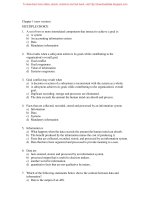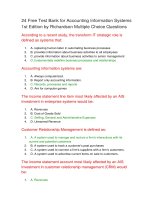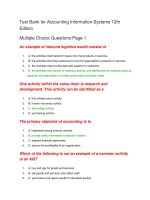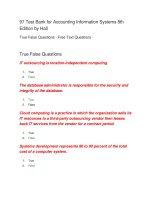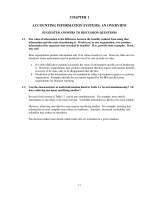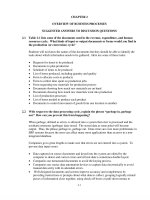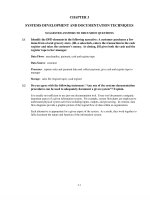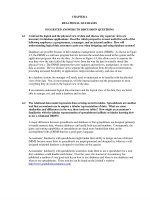Solution manual accounting information systems 12th edition by romney and steinbart CH03
Bạn đang xem bản rút gọn của tài liệu. Xem và tải ngay bản đầy đủ của tài liệu tại đây (783.55 KB, 46 trang )
Find more on www.downloadslide.com
CHAPTER 3
SYSTEMS DEVELOPMENT AND DOCUMENTATION TECHNIQUES
SUGGESTED ANSWERS TO DISCUSSION QUESTIONS
3.1
Identify the DFD elements in the following narrative: A customer purchases a few
items from a local grocery store. Jill, a salesclerk, enters the transaction in the cash
register and takes the customer’s money. At closing, Jill gives both the cash and the
register tape to her manager.
Data Flows: merchandise, payment, cash and register tape
Data Source: customer
Processes: capture sales and payment data and collect payment, give cash and register tape to
manager
Storage: sales file (register tape), cash register
3.2
Do you agree with the following statement: “Any one of the systems documentation
procedures can be used to adequately document a given system”? Explain.
It is usually not sufficient to use just one documentation tool. Every tool documents a uniquely
important aspect of a given information system. For example, system flowcharts are employed to
understand physical system activities including inputs, outputs, and processing. In contrast, data
flow diagrams provide a graphic picture of the logical flow of data within an organization.
Each alternative is appropriate for a given aspect of the system. As a result, they work together to
fully document the nature and function of the information system.
3-1
Find more on www.downloadslide.com
Ch. 3: Systems Development and Documentation Techniques
3.3
Compare the guidelines for preparing flowcharts and DFDs. What general design
principles and limitations are common to both documentation techniques?
Similar design concepts include the following:
Both methods require an initial understanding of the system before actual documentation
begins. This insures that the system is properly represented by the diagram.
Both measures require the designer to identify the elements of the system and to identify the
names and relations associated with the elements.
Both methods encourage the designer to show only the regular flows of information and not
to be concerned with unique situations.
Both approaches require more than one “pass” through the diagramming or flowcharting
process to accurately capture the essence of the system.
The product of both methods is a model documenting the flow of information and/or documents
in an information system. Both documentation methods are limited by the nature of the models
they employ, as well as by the talents and abilities of the designer to represent reality.
3-2
Find more on www.downloadslide.com
Accounting Information Systems
3.4
Your classmate asks you to explain flowcharting conventions using real-world examples.
Draw each of the major flowchart symbols from memory, placing them into one of four
categories: input/output, processing, storage, and flow and miscellaneous. For each symbol,
suggest several uses.
The major flowcharting symbols and their respective categories are shown in Fig. 3.8 in the text.
With respect to how the symbols are used, student answers will vary. Possible examples include
the following:
Input/Output Symbols
Document: an employee time card, a telephone bill, a budget report, a parking ticket, a
contract
Display: student information monitors, ATM monitors, the monitor on your microcomputer.
Manual input: cash registers, ATM machines
Processing Symbols
Processing: processing a student payroll program, assessing late fees
Manual operation: writing a parking ticket, preparing a paper report, collecting and entering
student payments
Storage Symbols
Magnetic disk: alumni information data base, a report stored on your PC hard disk
Magnetic tape: archival student information
On-line storage: a student information data base or an airline reservation data base stored
on-line.
File: purchase order file for a department, a student housing contract file
Flow (Miscellaneous)
Communication link: a telephone linkage that connects you to an on-line data base.
3-3
Find more on www.downloadslide.com
Ch. 3: Systems Development and Documentation Techniques
SUGGESTED ANSWERS TO THE PROBLEMS
Prepare flowcharting segments for each of the following operations:
3.1
Assorted Flowcharting Segments:
a.
processing transactions stored on magnetic tape to update a master file stored on
magnetic tape
Transactions
Old
Master
File
b.
File
Update
New
Master
File
processing transactions stored on magnetic tape to update a database stored on a
magnetic disk
Transactions
File
Update
Data
base
c. converting source documents to magnetic tape using a computer-based
optical character reader (OCR)
OCR Source
Documents
Conversion of
Documents to
Tape by OCR
Source
Data
d. processing OCR documents online to update a database on magnetic disk
OCR Source
Documents
Update
Data base
3-4
Data
base
Find more on www.downloadslide.com
Accounting Information Systems
3.1 (continued) Assorted Flowcharting Segments
e.
reading data from a magnetic disk into the computer to be printed on a report
Data
File
f.
Report
Report
Generation
using a computer or terminal to key data from source documents to a file stored
on a magnetic disk
Terminal
Data File
Source
Documents
Key Data
g.
manually sorting and filing invoices numerically
Invoices
Sort
Numerically
Invoices
N
3-5
Find more on www.downloadslide.com
Ch. 3: Systems Development and Documentation Techniques
3.1 (continued) Assorted Flowcharting Segments
h.
using a terminal to enter source document data and send it to a remote location
where an online processing system records it in a database stored on magnetic
disk
Terminal
Online
Processing
System
Data
base
Source
Data
i.
a scheduled automatic backup of an internal hard drive to an external hard
drive
Internal
Hard
Drive
j.
Scheduled
Automatic
Backup
External
Hard
Drive
using a terminal to query customer sales data maintained on a magnetic disk
Display
Query
Customer
Sales Data
Enter Query
3-6
Database
Find more on www.downloadslide.com
Accounting Information Systems
3.1 (continued) Assorted Flowcharting Segments
k.
enter employee hours recorded on time cards in the payroll transaction file
maintained on disk and update wage data maintained on the payroll master file
Payroll
Transaction
File
Terminal
Time Card
Record time card data on the
payroll transaction file and
update wage data maintained
on the payroll master file
Enter Time
Card Data
Payroll
Master File
3-7
Find more on www.downloadslide.com
Ch. 3: Systems Development and Documentation Techniques
3.1 (continued) Assorted Flowcharting Segments
l.
use a terminal to access a price list maintained on disk to complete a purchase
order. An electronic copy of the purchase order is sent to the vendor and a
backup copy is printed and filed by vendor name
Purchase Order
(electronic)
To Vendor
Access Price List, create
electronic purchase order
& print a paper backup
copy
Price
Data
Purchase Order
(paper)
A
m.
update an airline reservation on a Web-based airline reservation system from a
home computer
Request, complete,
and submit an
online reservation
change form
Revise reservation
data on web-based
airline reservation
system
3-8
Reservation
File
Find more on www.downloadslide.com
Accounting Information Systems
3.2
Happy Valley Utility Company
a.
Draw a system flowchart of the billing operations, commencing with the
computer preparation of the meter reading forms and ending with the mailing of
customer bills.
Customer
Master
File
Meter Form
Preparation
Meter Forms
Sort By
Cust #
Enter
Current
Reading
Completed
Meter Forms
Mark-Sense
Document
Reader
Customer
Meter
Data
Customer
Meter
Data
Customer
Master
File
File Update
and
Billing
Error List
& Summary
Report
Customer
Bills
Mail to
Customers
3-9
Find more on www.downloadslide.com
Ch. 3: Systems Development and Documentation Techniques
3.2
b.
Draw a system flowchart depicting customer payments processing, starting with
the mail room operations and ending with the two printed reports.
Checks
Remittance
Stubs
Correct
Stubs
OCR
Document
Reader
Compare
&
Separate
Checks
To
Cashier
Incorrect
Stubs
List of
Other
Receipts
Type
Correct
Stubs
Type
Correct
Stubs
Corrected
Stubs
Corrected
Stubs
Payments
Posting
Run
Report of
Past-Due
Accounts
Error List
& Summary
Report
Customer
Master
File
3-10
Find more on www.downloadslide.com
Accounting Information Systems
3.3
Prepare a system flowchart of the process described.
Payroll Processing for Dewey Construction Company:
Job Time
Tickets
Key to
Tape
Encodings
Job Time
Records
Tape
Payroll
Master
File
Work in
Process
Master
File
Payroll
Processing
System
Earnings
Statement
Payroll
Register
Paycheck
3-11
Error
Transactions
and Summary
Find more on www.downloadslide.com
Prepare a document flowchart to reflect how ANGIC Insurance Company processes its casualty claims.
3.4
ADJUSTER
CLAIMS DEPARTMENT
DATA PROCESSING
Notice of Loss
START
From
Claimant
1
Proof of
Loss Form
Prepare
proof of
loss, claim
recored
From
Claimant
2
3
4
1
Proof of
Loss Form
Notice of Loss
Notice of Loss
2
Claim Record
3
Claim Record
4
Prepare
Separate
Report
Assist
Claimant
with Form
2
Proof of
Loss
N
Adjuster's Report
To
Claimant
Adjuster's Report
1
1
Proof of
Loss
Proof of
Loss
2
2
Authorize
Claim
Payment
3
2
Proof of
Loss
Prepare
Check &
Disbursement
list
Disbursement
List
4
To Accounting
1
Adjuster's Report
Proof of
Loss
To
Claimant
Check
A
To
Claimant
3-12
N
Find more on www.downloadslide.com
3.5
a. Prepare a document flowchart that indicates the interaction and use of these
documents among all departments at Beccan Company’s central facility. It should
provide adequate internal control over the receipt, issuance, replenishment, and
payment of tires and supplies. You may assume that there is a sufficient number of
document copies to ensure that the perpetual inventory system has the necessary
basic internal controls.
b. Using the flowcharting conventions discussed in Focus 3.2, critique the instructor
provided CMA solution. List all the ways the CMA solution violates those
flowcharting guidelines.
Adapted from the CMA Exam. Note: the CMA solution shown does not follow the flowcharting
conventions discussed in the chapter. When the authors use this problem they have the students critique
the CMA exam solution (assignment 3.5b), based upon the conventions discussed in Focus 3.2.
3-13
Find more on www.downloadslide.com
Ch. 3: Systems Development and Documentation Techniques
3.6
a.
Prepare a context diagram and level 0 DFD to document the payroll processing
system at No-Wear Products.
Context Diagram for the payroll processing system at No-Wear Products
Employee
Time Card Data
Operating
Documents
Payroll
Processing
System
Employee
Paychecks
Internal
Reports
Management
Human
Resources
Department
Personnel Data
Withholding
Reports
3-14
Governmental
Agencies
Find more on www.downloadslide.com
Accounting Information Systems
3.6
a. (continued.)
Level 0 Data Flow Diagram for the payroll processing system at No-Wear Products.
Operating
Departments
Time
Card
Data
Human Resources
Department
Personnel
Changes
1.0
Process
Employee
Timecards
2.0
Update
Payroll File
Payroll File
4.0
Generate
Payroll
Reports
3.0
Generate
Paycheck
Internal
Reports
Employee
Withholding
Reports
Pay
check
Management
3-15
Governmental
Agencies
Find more on www.downloadslide.com
Ch. 3: Systems Development and Documentation Techniques
3.6
b. Prepare a document flowchart to document the payroll processing system at No-
Wear Products.
No-Wear Products-Payroll
Employees in Functional
Department
Payroll
Time Card
Record Time Data
Record
Time
Completed Time
Card
Enter Time Data
Process Payroll
Changes
Completed Time
Card
Enter Payroll
Changes
Payroll File
From Human
Resource Dept
Payroll Changes
N
Process Payroll,
Prepare Checks
and Reports
Paycheck
N
Employee
Management
Report
Management
Federal Tax
Report
Stat Tax Report
3-16
Goverrnment
Find more on www.downloadslide.com
Accounting Information Systems
3.7
a.
Prepare a context diagram and a level 0 DFD to document accounts payable
processing at S&S.
Purchasing
Receiving
Purchase Order
Receiving Report
S&S Accounts Payable
Invoice
Vendor
Accounts Payable
Report
Payment &
Remittance Advice
3-17
Management
Find more on www.downloadslide.com
Ch. 3: Systems Development and Documentation Techniques
3.7
a. (continued.) Level 0 Data Flow Diagram of S&S Accounts Payable
Vendor
Purchasing
Receiving
Invoice
Purchase Order
1.0
Record Payable
2.0
Collect & Store
Purchase Orders &
Receiving Reports
Receiving Report
Purchase Orders
Accounts
Payable
Vendor Invoices
Receiving
Reports
Cash
Disbursements
Journal
3.0
Make Payment
Accounts Payable
Report
4.0
Prepare
Management
Reports
Payment &
Remittance Advice
Paid
Invoices
Management
3-18
Vendor
Find more on www.downloadslide.com
Accounting Information Systems
3.7
b.
Prepare a document flowchart to document accounts payable processing at S&S.
S&S Accounts Payable
Accounts Payable
From Purchasing
From Receiving
Controller
From Vendor
A
Owner/Manager
Purchase Order
B
Receiving Report
Purchase Order
Receiving Report
Invoice
Purchase Order
Vendor Invoice
Receiving Report
Check 2
Invoice
A
A
Record
Accounts
Payable
Check 1
Accounts
Payable
Ledger
Review
and Sign
Checks
Prepare
Vendor
Checks
Vendor Invoice
Match Purchase
Order,
Receiving
Report,
Invoice
Check 1
Prepare
Monthly
Accounts
Payable
Cash
Disbursements
Journal
A
To Vendor
Accounts Payable
Report
Purchase Order
Receiving Report
C
D
Purchase Order
Invoice
Receiving Report
Check 1
Invoice
Purchase Order
Purchase Order
Check 1
Receiving Report
Receiving Report
Invoice
C
Check 2
Invoice
Accounts Payable
Report
Check
D
B
A
A
Review
Accounts
Payable
Report
3-19
D
Find more on www.downloadslide.com
Ch. 3: Systems Development and Documentation Techniques
3.8
a.
Develop a context diagram and a level 0 DFD of the acquisition/payment system
at Oriental Trading.
Purchase Requisition
Purchase Order
Vendor
Vendor Acknowledgement
Inventory
System
Acquisition/
Payment
System
Receiving Report
Purchase Invoice
Vendor Payment
3-20
Find more on www.downloadslide.com
Accounting Information Systems
3.8
a. (continued) Level 0 Data Flow Diagram: Acquisition/Payment System at Oriental
Trading:
Inventory
File
Vendor
File
1.0
Prepare
Purchase
Order &
Notification
Purchase Order
Purchase Requisition
Vendor
Vendor
Acknowledgement
Inventory
System
P.O. Notification
Vendor
Invoice
Receiving Report
Receiving Reports
2.0
Update
Accounts
Payable
Purchase Orders
Vendor Invoices
Accounts
Payable
Master
File
Check
Payment Authorization
3.0
Pay Vendor
General
Ledger
3-21
Find more on www.downloadslide.com
Ch. 3: Systems Development and Documentation Techniques
3.8
Prepare a document flowchart to document the acquisition/payment system at
Oriental Trading.
b.
Oriental Trading Acquisition/Payment System
Purchasing
Accounts Payable
B
From Inventory
Purchase
Requisition
Accounting Department
D
Inventory
File
Prepare Purchase
Order
A
From Receiving
Department
From Vendor
Purchase Order
Notification
Receiving Report
Invoice
D
D
D
Enter Purchase
Requisition
Payment
Authorization
Enter payment
Authorization
Vendor
File
Purchase Order
Match Purchase
Order, Receiving
Report, and
Invoice. Prepare
Payment
Authorization
D
Prepare Check,
Update Accounts
Payable and
General Ledger
Payment
Authorization
B
To Vendor
Check
From Vendor
Purchase Order
D
Vendor
Acknowledgment
Enter Accounts
Payable Data for
Update
Receiving Report
Invoice
Enter Vendor
Acknowledgment
Prepare Purchase
Order Notification
Purchase Order
Notification
To Vendor
Update Accounts
Payable Master
File
D
Accounts
Payable Master
File
A
3-22
General
Ledger Master
File
Find more on www.downloadslide.com
Accounting Information Systems
3.9
a.
Develop a context diagram and a level 0 DFD for the cash receipts system at
S&S.
Bank
Deposit
Payment at
Sale
Cash Receipts
System
Customers
Remitances
on Account
Cash
Receipts
Report
Management
Aged Trial Balance
Credit and
Collections
3-23
Find more on www.downloadslide.com
Ch. 3: Systems Development and Documentation Techniques
3.9
a. (continued)
Customers
Level 0 Data Flow Diagram of the Cash Receipts System at S&S:
Remittance
File
Payments at
Sale
Remittances
on
Account
1.0
Process
Payments
Remittance
Slips
2.0
Update
Customer
Accounts
Endorsed
Checks &
Cash, Deposit
Slip
Bank
Accounts
Receivable
Ledger
3.0
Prepare
Reports
Aged Trial
Balance
Cash
Receipts
Report
Management
3-24
Credit and
Collections
Find more on www.downloadslide.com
Accounting Information Systems
3.9
Prepare a document flowchart to document the cash receipts system at S&S.
b.
S&S Cash Receipts System
Treasurer
Clerk
Accounts Receivable
From Customer
A
B
Cash and Checks
Cash and Checks
Remittance Slip
Remittance Slip
B
Deposit Slip
Update
Accounts
Receivable
Ledger/File
To Bank
Accounts
Receivable
Ledger/File
Endorse
Checks and
Prepare
Deposit Slip for
Cash & Checks
Remittance Slips
Generate
Weekly
Reports
Cash and Checks
D
Deposit Slip
Cash Receipts
Report
Aged Trial Balance
A
To Management
To Credit &
Collections
3-25
